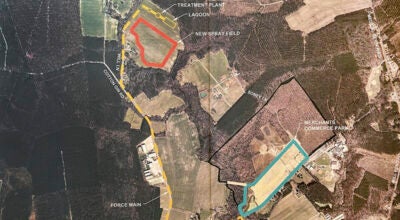Primary ballot finalized
Published 9:27 am Tuesday, January 12, 2016
Choices, choices…there are plenty of choices.
North Carolina voters will have plenty to choose from when the state’s presidential primary is held in less than 10 weeks.
North Carolinians will head to the polls for a primary in 2016 on March 15. Traditionally, the state has held its election year primary in May, but last year the General Assembly in Raleigh passed a bill shifting the primary date nearly two months ahead and Gov. Pat McCrory signed the bill into law last fall.
As we approach the 2016 primary on March 15, here are some important dates to keep in mind.
Voters can begin asking for mail-in absentee ballots for the primary starting Jan. 25. Early in-person voting (one-stop) begins March 3.
The regular voter registration deadline is Friday, Feb. 19.
One-stop early voting runs Thursday, March 3 until Saturday, March 12 at 1 p.m.
Same-day registration is also available during the one-stop early voting period, subject to ongoing litigation.
Each party had until last month (Dec. 21) to give their county Elections Board its lists of candidates. State law says the lists must be composed of candidates whose candidacies are “generally advocated and recognized in the news media” throughout the country or in North Carolina.
Incumbent Republican Gov. Pat McCrory will face two primary challengers within his own party as he seeks a second term in the Governor’s Mansion: current state House of Representatives member C. Robert Brawley, who represents Iredell and Catawba counties, and was an unsuccessful 2004 candidate for Insurance Commissioner before losing to Jim Long. Also running on the GOP side is Charles Moss, a former Randolph County evangelist radio preacher and technical school instructor who also ran for the office against McCrory in 2012.
On the Democratic side, popular four-term state Attorney General Roy Cooper, who won four statewide elections as attorney general since 2000, is seeking the Governor’s seat. In 2008, he won with over 61% of the vote, and in 2012, he ran unopposed. He will face a primary challenge from former state Representative and Durham attorney Ken Spaulding.
In the Lt. Governor’s race, incumbent Dan Forest has no Republican challengers, but on the Democratic side ex-State Personnel Director, former General Assembly member, and Wake County Commissioner Linda Coleman will seek the office again. Joining her on the Democratic ballot will be Asheville native and ex-Buncombe County Commissioner Holly Jones, Durham businessman Ron Newton, and former long-time state employee Robert Wilson, originally from Fayetteville.
The U.S. Senate race features two-term Republican incumbent and Winston-Salem native Richard Burr facing opposition from within his own party as GOP challengers include Wake County obstetrician Greg Brannon, a tea party activist and candidate for the U.S. Senate in 2014; Greensboro businessman Larry Holmquist; and retired Superior Court Judge Paul Wright.
Democratic challengers for Burr’s Senate seat include Spring Lake mayor and Bronze Star recipient Christia V. Rey; former State Representative and Raleigh lawyer Deb Ross; Durham businessman Kevin Griffin; and retired U.S. Army Iraq War veteran and Greenville businessman Ernest T. Reeves.
A whopping 27 candidates are listed on the ballot for President of the United States.
On the Republicans’ side the candidates (listed alphabetically) are: Jeb Bush, Ben Carson, Chris Christie, Ted Cruz, Carly Fiorina, Jim Gilmore, Mike Huckabee, John Kasich, Rand Paul, Marco Rubio, Rick Santorum and Donald J. Trump.
The names of two Republicans who have suspended their campaigns were left off by the board. California businessman Rocky De La Fuente was added to the Democratic slate because he collected at least 10,000 signatures to qualify, his only other option to get on the ballot.
De La Fuente will be joined on the Democratic ballot by Democrats Martin J. O’Malley, Bernie Sanders and Hillary Clinton.
The Libertarian Party lists a large variety of candidates on its slate. They are, again alphabetically: Marc Allan Feldman, John David Hale, Cecil Ince, Gary Johnson, Steven Elliott Kerbel, Darryl W. Perry, Austin Petersen, Derrick Michael Reid, Jack B. Robinson Jr., Rhett Rosenquest Smith, and Barbara Joy Waymire.
Initially, lawmakers had hoped to hold North Carolina’s primary as early as the end of February to immediately follow South Carolina, but Republican National Committee leadership said it would penalize the state for breaking party rules. That move would have cost the state Republicans 60 of their 72 delegates to the national convention in Cleveland. The state GOP urged against it because North Carolina has the sixth largest delegation count to the convention, giving it major clout.
Other state primaries to be held on the same day as North Carolina’s are Ohio, Florida, Illinois and Missouri.
An earlier presidential primary gives North Carolina a better chance of playing a more important role in the nominating process. In past presidential years, major parties had often already picked their nominees by the time North Carolina voted in May.


